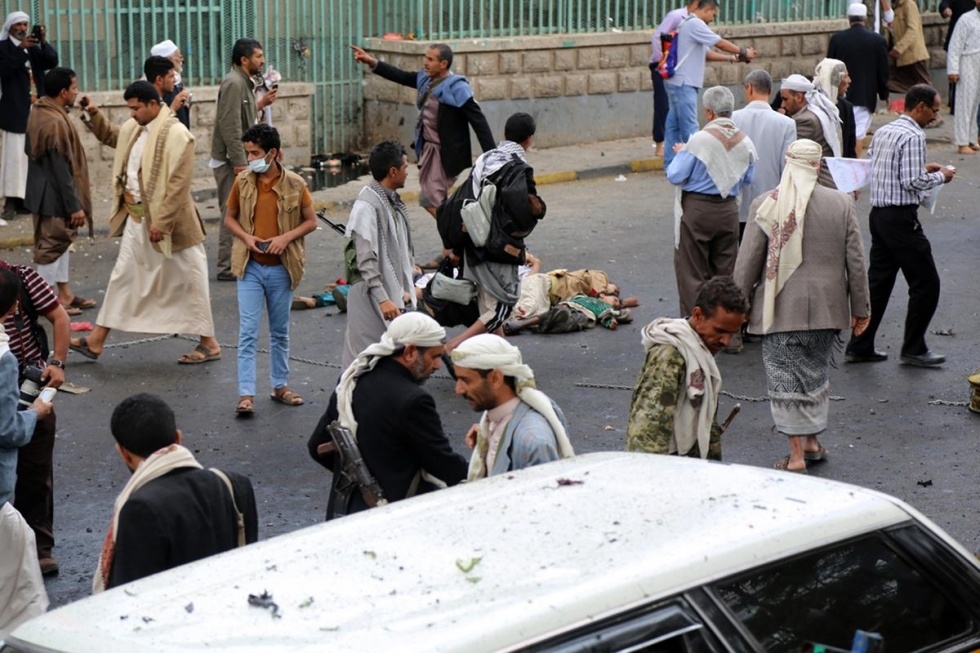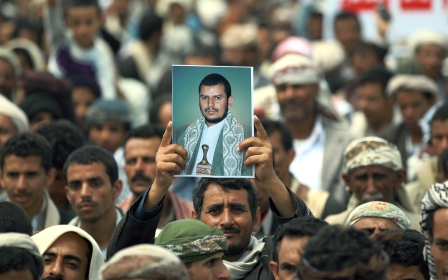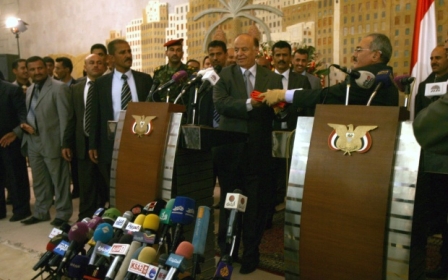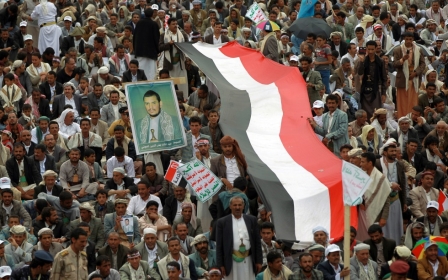44 killed in Yemen as suicide bomber targets rebel rally

A suicide bomb that exploded at a protest in Yemen's capital has killed at least 44 people, including five children in one of the deadliest attacks on the city in years, security and medical sources said.
Children were among those killed when the bomb ripped through Tahrir Square, a busy market close to Yemen’s parliament building, on Thursday morning smashing windows and sending debris flying across the road.
A man wearing an explosive belt blew himself up as he was being searched at the entrance to a rally where supporters of the Houthi rebel group had gathered to protest the appointment of a new Prime Minister, a security official told MEE.
A video from the attack’s aftermath showed soldiers dragging bodies away from a car engulfed in flames. Another showed three boys in white robes laid out in a line on the tarmac, their faces smeared with blood.
"I was in a cafeteria having breakfast, I heard a big explosion. I ran there, in front of the bank, there were bodies everywhere. I counted 15. I don't know how many were injured, it was so massive,” said Raidan Ameen, a filmmaker.
After ambulances carried the dead and injured away, thousands of Houthi supporters flooded the square condemning the attack and calling on Yemen’s President Abd Rabbuh Hadi to resign.
Al-Masirah, a Houthi TV channel, showed a Houthi cleric in Tahrir blaming the “American embassy” for the attack in front of an incensed crowd.
“The blood of these Yemeni children is on US hands and its vile al-Qaeda and Islamic State creation,” the cleric said.
Nobody has yet claimed responsibility for Thursday's bombing. However Yemenis say it bears the hallmarks of similar attacks carried out by al-Qaeda in the Arabian Peninsula (AQAP).
In another attack in southeastern Yemen, a suspected Al-Qaeda suicide bomber killed 20 soldiers at an army checkpoint, the military said.
Sectarian fears
Al-Qaeda in the Arabian Peninsula, a Sunni extremist militant organisation with an active presence in Yemen, have targeted the Houthis, a group they consider heretical.
Last month a hospital controlled by Houthi fighters in Yemen’s east was hit by a car packed with explosives, an attack AQAP claimed responsibility for.
After Thursday’s bomb attack, the worst to rock the capital since a suicide attack killed 90 soldiers in an army parade in 2012, Yemenis said they suspected orchestrators of trying to stoke a sectarian war in Yemen.
After a month of protests against fuel subsidies, the Houthis, a rebel group from the minority Zaydi sect - an offshoot of Shiism dominant in Yemen’s north - overran the capital in late September, seizing government buildings and demanding Hadi form an inclusive government and devolve power to their community.
The US and Saudi Arabia, Yemen’s oil-rich neighbour, have both condemned the Houthis for bringing arms into the capital and threatening stability.
The impoverished Arabian nation, a patchwork nation of tribes and religious sects, has largely avoided sectarian conflict of the kind found in other parts of the Middle East. The 2011 uprising saw Yemenis – Sunni and Shiite, secularist and Islamist – put aside differences in the name of battling the shared injustices of poverty and corruption.
“For the first time since the 1960s we have sectarianism returning to the forefront of mainstream politics,” said Yemeni analyst, Abdulghani al-Iryani told MEE. “It is now a key factor in forming political alliances.”
“We don’t know,” said Faizah Suleimani, a Yemeni activist who lives close to Tahrir, when asked who she thought was responsible for the attack. “It could be al-Qaeda, it could former president Saleh’s gang, the Muslim Brotherhood... All I know is we will get used to this from now onwards. The violence will continue.”
New MEE newsletter: Jerusalem Dispatch
Sign up to get the latest insights and analysis on Israel-Palestine, alongside Turkey Unpacked and other MEE newsletters
Middle East Eye delivers independent and unrivalled coverage and analysis of the Middle East, North Africa and beyond. To learn more about republishing this content and the associated fees, please fill out this form. More about MEE can be found here.




